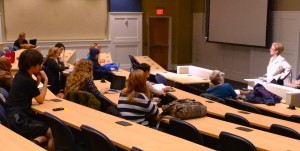By Serena Wasserman
Correspondent
Simona Sharoni, an internationally recognized Israeli feminist and a professor at SUNY Plattsburg came to the College on Wednesday, Feb. 27 to speak about women’s grassroots political organizations and their role in the Israeli-Palestinian conflict. This was the first of several lectures that will be held at the College in honor of women’s history month.

Sharoni focused on describing the challenges and triumphs that women face when trying to organize a political movement with a feminist twist.
“I’ve seen women’s peace groups at their best and at their worst,” she said.
In the Middle East in particular, Palestinian and Israeli women were at first unable to move past basic discourse about their commonalities. When it came to organizing actual events, members could not come to a consensus.
In one meeting, for example, Palestinian women suggested holding a protest outside of a prison where Palestinian juveniles were being held for throwing stones at Israeli military occupants. Israeli women, however, were unwilling to defend minors who threw stones at the Israeli soldiers. The Palestinian women argued that Israeli occupation was unjust, and therefore punishing the children for taking action was unfair and needed to be addressed.
That particular women’s group fell apart, but down the road, others which were more effective took their place.
For example, during the second intifada (the Arabic word for uprising), Palestinian women’s groups organized a website that called for the boycotting of Israeli companies that profited from the Israeli occupation in Palestine. This time, Israeli women were more open to the idea that the Israeli occupation of Palestinian territory was wrong, and some participated in the boycott despite the Israeli government’s declaration that the boycott was illegal.
Sharoni also made a daring connection between politics and domestic violence, one that caused her to receive a lot of backlash from the established feminist community.
“A Palestinian man who has to drive through Israeli checkpoints and show his ID is more likely to get frustrated and then go home and abuse his wife,” Sharoni said. This was a message that she relayed directly from Palestinian women with whom she has come into contact with over the years.
She also cited that the same political-domestic violence connection holds true in Israel, where as a militant nation, Israeli men are more likely to have access to weapons that they in turn can use to harm their wives.
Attendees of the lecture were fascinated by her stories.
“I thought it was very enlightening to hear the Palestinian-Israeli conflict from a feminist perspective,” said math and secondary education double major Ilana Feldscher.
Sharoni left the audience with a poignant question, “If we don’t create a space where we constantly invite difference … how can we transform the world?”






